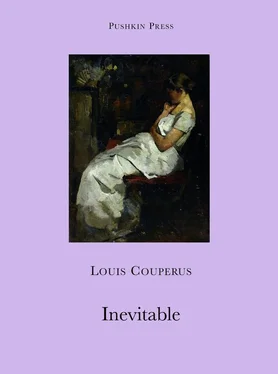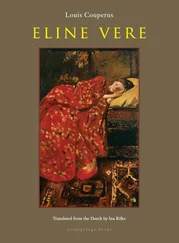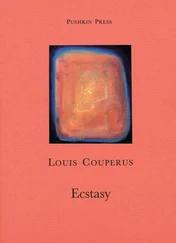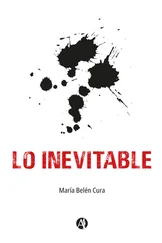Louis Couperus
Inevitable
THE MARCHESA BELLONI’S pensione was situated in one of Rome’s most salubrious, if not most poetic, quarters: half the house formed part of a villa from the ancient Ludovisi gardens, those beautiful old gardens lamented by everyone who knew them before the apartment blocks had risen where the exclusive Roman residential area had once extended. The pensione was in Via Lombardia; the old villa section had retained a certain antique charm for the marchesa ’s guests, and the newly built extension offered spacious rooms, running water and electric light. The pensione had something of a reputation for being good, cheap and pleasantly appointed; a few minutes’ walk from the Pincio, and high up so that one need have no fear of malaria, and the price one paid for an extended stay, which was just over eight lire, was exceptional for Rome, well known for being more expensive than any other Italian city. Consequently the pensione was usually full: travellers arrived as early as October — those who arrived earliest in the season paid least; and apart from a few tourists in a hurry most of them stayed on till Easter, before making their way down to Naples after the great church festivals.
The pensione had been warmly recommended by English fellow-travellers to Cornélie de Retz van Loo, who was travelling alone through Italy and had written to the Marchesa Belloni from Florence. It was the first time she had travelled in Italy; it was the first time she had alighted at the great, cavernous Termini station close to the baths of Diocletian, and in the square, in the golden Roman sunshine, while the great Acqua Marcia fountain babbled and the coachmen cracked their whips and clicked their tongues (to catch her attention), she had her “precious Italian sensation” as she had imagined, and was glad to be in Rome.
She saw a little old man with ‘Hôtel Belloni’ written on his cap limping towards her, with the instinct of a veteran porter who immediately recognises his travellers, and she signalled to him with a smile. He greeted her like a long-lost friend, at once familiar and respectful, as if pleased to see her, asked whether she had had a pleasant journey, whether she was tired, accompanied her to the victoria, adjusted her travel-rug and her valise, asked for the ticket for her cases, and said that she should go on ahead: he would follow in ten minutes with the luggage. She found it fun, being looked after by the old fellow with the limp and gave him a friendly nod as the coachman drove off. She felt light and airy, with just a tinge of melancholy at the unknown things that were to happen to her, and looked left and right, taking in the streets of Rome: she saw nothing but houses and houses, apartment blocks; then a great white palace: the new Palazzo Piombino — where she knew the Ludovisi Juno was — and then the coachman pulled up, and a bell boy came up to her. He took her to the lounge, a dark room with a table in the centre covered in magazines, arranged in a neat, still unread circle; two ladies, obviously English, and of the aesthetic sort — grubby hair, loose blouses — were sitting in a corner studying their Baedekers before going out. Cornélie nodded briefly, but received no acknowledgement; she did not take it amiss, being familiar with the ways of English travellers. She sat down at the table and picked up the Roman Herald, the paper that appears fortnightly and gives information about everything there is to do in Rome, and at that point one of the ladies addressed her aggressively from a corner,
“I’m sorry, but you will be sure not to take the Herald to your room, won’t you?”
Cornélie turned her head loftily and languidly towards the corner where the ladies were sitting, looked vaguely past their grubby heads, said nothing and looked back at the Herald , found herself a seasoned traveller and smiled inwardly, because she knew how to behave with this kind of English lady.
The marchesa came in and welcomed Cornélie in Italian and in French. She was a fairly plump matron, in a vulgar way; her ample bosom was contained in a silk cuirasse or spencer that shone at the seams and was bursting under the arms: her grey coiffure gave her a lion-like appearance; the large eyes, lined with yellow and blue, were opened unnaturally wide by belladonna; in her ears huge crystals created a rainbow effect, and bands of nameless precious stones girded her podgy fingers. She spoke very fast, and Cornélie found her phrases as pleasantly homely as the welcome of the crippled porter on the station square. She allowed the marchesa to escort her to the lift, and got in with her: the hydraulic lift, a barred cage that ascended past the staircase, climbed at a stately pace and came to a sudden halt between the second and third floors.
“Third floor!” the marchesa called down.
“ Non c’é acqua! ” the bellboy called back calmly, meaning — as seemed quite natural — that there was insufficient water to start the lift moving.
The marchesa barked a number of orders; two facchini appeared, hoisted themselves up with the bustling bellboy on the cable of the lift, and in fits and starts the cage rose higher and higher till it finally, almost, reached the third floor.
“A little higher!” ordered the marchesa .
But flex their muscles as the facchini might, the lift would not budge.
“We can still get out!” said the marchesa . “Wait a moment.”
With a long stride, baring her huge white calf, she stepped onto the floor, smiled and extended her hand to Cornélie, who copied her gymnastics.
“We’re here!” sighed the marchesa with a satisfied smile. “This is your room.”
She opened a door and showed Cornélie a room. Although it was bright and sunny outside, the room was as dank as a cellar.
“ Marchesa ,” said Cornélie at once, “I wrote to you that I wanted two rooms facing south.”
“Really?” asked the marchesa in a naïve, innocent tone. “I really couldn’t remember. Yes, foreigners are always so set on south-facing rooms … I can assure you this is a lovely room.”
“I’m sorry, but I can’t take it, marchesa .”
‘La Belloni’ grumbled a little, then went down the corridor and opened another room.
“What about this room, signora … What do you think of this …?”
“Is it south-facing?”
“Almost.”
“I must have due south.”
“This faces west: you’ll see the most wonderful sunsets from your window.”
“I absolutely must have a south-facing room, marchesa .”
“I have some most charming east-facing rooms: the most beautiful sunrises.”
“No, marchesa …”
“Have you no feeling for natural beauty?”
“A little, but I’m a lot more concerned about my health.”
“I sleep in a north-facing room myself.”
“You’re Italian and you’re used to it, marchesa .”
“I’m very sorry, but I have no south-facing rooms.”
“Then I’m sorry too, marchesa , but in that case I shall have to look elsewhere.”
Cornélie turned away, as if to go. The choice of a room can be the choice of a lifetime …
The marchesa took her hand and smiled. She abandoned her cool tone and her voice was soothing as balm.
“ Davvero , foreigners are so set on south-facing rooms! I still have two cubby-holes. Here …”
And she quickly opened two doors: two small, cosy, sunny long and narrow rooms, and from the open windows a lofty, wide panorama over the streets and roofs below and in the distance the blue dome of St Peter’s.
Читать дальше












